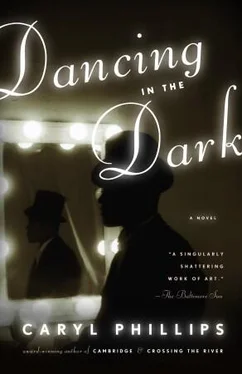Fanny Brice squeezes his arm. You ready to go now, Bert? Fanny knows her fellow performer well. He has taken just two sips of his champagne, for this is not his drink of choice. Maybe you should just say something to Ziggy, then I reckon you can be on your way, don’t you? He looks over, but Mr. Ziegfeld is surrounded by a press of people and he understands that should he approach he will merely elicit from these men a few conversational volleys before they return to their real business. He decides instead to gracefully retreat into the evening. Tomorrow he will compose a letter to Mr. Ziegfeld thanking him for his generosity and support over the years, but right now he will quietly collect a few things from his dressing room and slip through the stage door of the New Amsterdam Theatre for the final time.
He decides to walk back a part of the way home, and as he sets out in the direction of the park he remembers the group of affluent colored men who some years ago, shortly after he began to perform for Mr. Ziegfeld, requested an audience with him. He was familiar with the name of only one of the three men who signed the elegantly worded request, and although he could not be exactly sure why they wished to visit with him, he imagined that it most likely related to potential investment in his future productions. He wrote back and invited them to present themselves at 2309 Seventh Avenue the Sunday after next, and he asked his wife to prepare tea. However, when Mother opened the door on the appointed Sunday afternoon, instead of the three men that she was expecting there were, standing before her, six finely dressed colored men, who she politely ushered into the library, where her husband was waiting. There were not enough chairs to accommodate them all, and so his wife went to find more, and once everybody was settled, and once Mother had poured tea for the men, she left her husband alone with his delegation. Mr. Charles Wilson, a prominent banker, began first, speaking at some length about the importance of Bert to the Negro community, and generally laying the groundwork for what was to come. But by now Bert already knew what was to come, yet he listened patiently, and when their conversation finally corroded into admonition (Why, Mr. Williams, do you choose to play the shambling, pathetic dupe?) , albeit carefully dealt, he sat forward and began to speak in a low voice, the words falling softly from his mouth. The Negro I portray is not any man in this room so there is no need for any among you to behave defensively. In fact, I have to believe that my public is sophisticated enough to understand that I am impersonating a particular type who does not exist except in my imagination. Mr. Nail interrupted: And in their imagination, Mr. Williams. We exist in their imagination as you portray us, and you reinforce their low judgment of us as dull and pitiable. An exasperated Bert opened his arms wide. Am I responsible for the coarse imagination of some few among my audience? Am I responsible for how the Negro is viewed in America? I am an entertainer, what would you have me do? Stop performing? At this point everyone began to speak at once, assuring him no, of course not. He must not abandon the American stage. Mr. Williams, said Mr. Nail, his voice soaring now above the others, I would, first, have you perform in theaters that neither bar nor Jim Crow Negroes, and second, I would have you perform in the guise of somebody whose persona and demeanor is closer to that of the new, twentieth-century Negro, as opposed to a low type who is a deliberate travesty of our race. We do not know, and have never known, this man who you impersonate. Right now we need colored thespians who are prepared to drag your troubled profession toward dignity, for it would appear that the Negro is only acceptable on the American stage as long as he is singing idle coon songs and dancing foolishly. In other words, as long as he is a close approximation to the white man’s idea of a nigger. Players who indulge in this so-called art are wounding the race, and we are here today to implore you to risk offending your white admirers by simply casting aside this nigger coon for such an impersonation has long been out of respectable commission. Mr. Nail paused before concluding. We sincerely believe that a man of your talent is fitted for higher things than singing idle coon songs and dancing foolishly, and surely you must believe so too. Silence fell in the room and Bert felt resentment begin to rise like sap inside of him. He looked from one well-groomed colored face to another, unable to comprehend why these six supposedly intelligent men could not understand that he was merely playing a character. His darky was clearly not representative of them or their worlds. His coon was a very particular American coon as seen by a man from the outside. In the end, his frustration was such that he knew he could no longer find any polished words or phrases to share with these six gentlemen and so he remained silent and simply let his feverish thoughts run loose in his mind. Gentlemen, be fair. I am merely trying to give this low-bred colored man some humanity. My colored man may be interpreted by some as a gin-guzzling, crap-shooting, chicken-stealing, no-good nigger, but there is more to him than this. He suffers. Our compassion goes out to him. He shuffles a little, and he may be slow witted, but we surely recognize this poor man. The essence of my performance is that we know and sympathize with this unfortunate creature. Eventually his feverish thoughts stopped racing around his mind, but he could still find no polished words or phrases to share with this delegation, and so he calmly finished his tea and looked from one handsome face to the next.
Shortly after the unsolicited visit of the colored gentlemen, and after his anger at their intrusion into his life had begun to recede, he decided to attempt to repair his relationship with Aida, who seemed to hold him personally responsible for not keeping poor George’s name in lights. He sat at the desk in his library and stared at the blank piece of paper before him. A letter seemed like a polite and convenient way to unburden himself, and he fully intended to speak freely about the many issues that seemed to have come between himself and Aida over the years. But his pen would not move. He listened intently to the silence that dominated the house, a silence that was broken only by the noise of automobilists in the street. What was he supposed to say to Aida? That he was sorry that she seemed to have decided to cut off relations with both himself and his wife? Confess to her that her behavior cast a shadow over his memories of the man with whom he had spent the greater part of his working life? He stared at the blank sheet and realized that he could neither ask nor demand anything of Aida, yet to simply unburden himself of his own private hurt seemed an uncharitable gesture. He waited and hoped that by some strange process the right words might come to him, but as the daylight began to fade he found himself looking at the still untouched piece of paper. And then he decided that it might be more appropriate if he were to make the conciliatory gesture of attending an Aida Overton Walker performance and visiting with her after the show, and in this way rekindling what had once been, if not a friendship, a harmonious professional acquaintance. He also hoped that some of the words that he wished to set down on paper might flow more easily once they were facing each other.
He sits in the front row of the balcony and observes that she still dances well, if somewhat eccentrically and in bare feet, but he understands that this style is her own contribution to the world of dance. She moves with some elegance, but to his eyes the outlandish grand sweeping of the hands and arms seems to suggest that Aida is more interested in arousing attention than she is in perfecting dance as an art form. The audience is clearly somewhat mystified by what is being presented to them, and at the conclusion of the evening a good number of patrons withhold their applause, although he does not feel it proper that he should participate in this silent protest. And so he applauds enthusiastically, so much so that those around him look in his direction and immediately recognize the source of the excitement. Embarrassed that he has attracted attention to himself, and eager that his presence should not detract in any way from Aida’s evening, it occurs to him that he should leave the theater. The next morning he decides to visit with Aida at her apartment on West 132nd Street and offer his congratulations in person, but having purposefully walked the few blocks to Aida’s place, and having climbed the steps to the door and sounded the bell, he waits but nobody answers. He now knocks at the door, and then begins to worry that something might have happened to Aida, for she had looked somewhat distracted onstage, but slowly the truth begins to dawn on him. She does not wish to see him. He knocks again, but this time without passion.
Читать дальше












